Fact Check on McCain and Political Progress in Iraq
John McCain has been running mainly against Barack Obama in recent days, and has been running on the successes he says that the Iraqi government has racked up.
McCain (and the US corporate media) manages to avoid noticing that Turkey has staged a major incursion into Iraq and still has ground troops there and is refusing US requests to withdraw! Ironically, Gen. Yasar Buyukanit, the Turkish chief of staff used McCain's own language against the Bush administration, rejecting the idea of any timetable for withdrawal. He said Turkey could be in Iraq for as long as a year! Turkey claims to have killed 230 guerrillas of the Kurdish Workers Party inside Iraq in the past week. I mean, how great can the situation in Iraq be when our NATO ally has invaded the country we militarily occupy in order to kill guerrillas harbored by our Iraqi Kurdish allies, who have been slipping across the border for which we are responsible in order to kill dozens of NATO troops in eastern Anatolia?
Aljazeera English has video:
McCain is completely uninterested in the cost of the Iraq War. He hasn't seemed to notice that oil has surged to $103 a barrel, in part on fears of the effect of the Turkish incursion into Iraq.
McCain, who voted to go into Iraq and said it was "important" to do so, does not seem to have noticed that the price tag for it and Afghanistan is rapidly rising to $3 trillion to $5 trillion over the long term, or $10,000 for each man, woman and child in America. For a family of four, that is $40,000 or a whole year's salary that George W. Bush has stolen from us and given to his friends at Halliburton, Hunt Oil, Exxon Mobile, Lockheed Martin, Boeing, General Electric, etc., etc., etc. (See Tom Engelhardt on this and other morsels in Bush's Mulligatawny Soup of a war). Not to mention the nearly 4,000 killed in action and the thousands seriously wounded, with brain trauma, spinal injuries, confined to wheel chairs or forever impaired, who will need to be taken care of the rest of their lives (and guess to which address the bill will come-- not Crawford, Texas.) Is the war really unrelated to the growing bad times in the US economy?
Bush's loathsome toadies actually come out and say that all this spending of our blood and treasure is the price of security. But Iraq did not attack the US and was no danger to the US, and the Iraq War is actually actively producing a terrorist danger to our security, according to veteran CIA official and now security analyst Marc Sageman. All this is not to mention the invidious way the Bush administration has framed the terrorism issue, as Noam Chomsky points out at Tomdispatch.
Back to McCain: Running on the efficiency and effectiveness of the failed state in Baghdad would be an extremely risky strategy if in fact the US corporate media were telling the American people the truth (or even just anything) about what is actually going on in Iraq and Iraqi politics. So here is a fact check on two of the claims McCain is making about supposed political progress in Iraq. He has been touting a new law on the treatment of ex-Baathists (who are mostly Sunni and have been treated harshly, contributing to the violence). And he has been ecstatic about the passing of a law on the provinces and some other measures, like the budget. But is any of these laws really likely to lead to ethnic reconciliation?
In his recent response to a measure introduced by Senator Russ Feingold aimed at ending the Iraq War, John McCain ridiculed Iraq War critics who doubted the surge and doubted provincial reconciliation (as at al-Anbar):
"In the face of these new facts, supporters of withdrawal changed their argument yet again. Maybe the surge had brought about greater security, they said . . . But this was irrelevant, they said, so long as national level political reconciliation is lacking – and since we can never expect that, the troops must leave. Yet they were wrong again. In January, the Iraqi parliament passed the long-awaited de-Baathification law that restores the eligibility of thousands of former party members for government jobs lost because of their Baathist affiliation."
In fact, the so-called "debaathification law" passed in January was ruined by the followers of Muqtada al-Sadr in the Iraqi parliament. Far from promoting reconciliation between Shiites, Kurds and ex-Baathists, it was roundly denounced by ex-Baathist parliamentarians such as Iyad Allawi and Salih Mutlak. The law may forcibly retire another 20,000 to 30,000 largely Sunni ex-Baathists from their jobs, and it excludes them from many important ministries. Allawi and others are afraid that its language aims at excluding them from politics altogether. The International Center for Transitional Justice warned (pdf) that the law would actually make for less reconciliation!
Sam Dagher reports from Baghdad,
' Iraq's parliament passed a new law on Jan. 12 amending de-Baathification legislation . . but critics say it is even stricter than the first and offers even fewer chances for thousands of embittered, high-ranking Baathists to return to the fold . . .
Izzat Shabender, a secular Shiite parliamentarian from the party of ex-prime minister Iyad Allawi, who was on the committee that dealt with the law, says senior Baathists that he's in contact with, mainly in Jordan and Syria, have rejected the law. "It did not solve the problem politically, which is the core of the matter." '
Now back to starry-eyed McCain (same link as above) on all that political reconciliation:
McCain: "Earlier this month, a provincial powers law passed that devolves a significant amount of power to the provinces and mandates new provincial elections by October 1 of this year. The parliament passed a partial amnesty for detainees that can facilitate reconciliation among the sects, and it completed a landmark 2008 budget."
Oooops. As usual, McCain is too optimistic too soon. The LA Times reports that:
' Iraq's presidential council Wednesday rejected a law on the powers of local government that was approved by parliament and touted by the Bush administration as a sign of reconciliation between the country's ethnic and religious groups. The three-man council asked that parliament reexamine the complicated and multifaceted law when it reconvenes March 18. '
The LAT notes that the rejection of this law could place in jeopardy the package of laws passed in February, which McCain boasts about, including the budget and the prisoner amnesty.
At the time, the way the laws were passed, without an individual voice vote of the members of parliament, was decried as unconstitutional, in any case. Now the most important of the three has been rejected by the presidency council.
The law on the provinces allowed the prime minister to dismiss provincial governors. Since the Islamic Supreme Council of Iraq controls the provincial governments of much of the Shiite south, it doesn't want the federal government to be able to remove them and so weaken ISCI's power base. Likewise, the Kurds are very suspicious of any move to strengthen the central government, because of their memory of Saddam Hussein's brutal interventions against them from Baghdad.
But the law also had set provincial elections for October 1, and this was something the Sunni Arabs very much wanted, since they boycotted the first round of provincial elections and so their provinces don't have representative governments.
The Islamic Supreme Council, in contrast, is afraid that if new provincial elections are held, it might be swept from power in Baghdad and much of the south by the followers of Muqtada al-Sadr, who are Iraqi nativists and see ISCI as an Iranian cat's paw.
So, the political progress of which McCain boasted, and which he threw in the face of Senator Feingold and Speaker of the House Nancy Pelosi, has largely been a chimera. Even where parliament has passed laws, there is no evidence that they have contributed or will contribute to actually reducing ethnic and sectarian hatred in Iraq.
McCain argues that violence is down in 17 of 18 provinces. That argument itself suggests the irrelevancy of the US to Iraq. There are no US troops to speak of in the 3 northern Kurdish provinces, or in the southern 4 provinces from which the British have largely withdrawn. There are few US troops in most of the 8 provinces where Shiites predominate. There was no troop escalation or "surge" in the Sunni al-Anbar province. So if violence has declined in 17 of 18 provinces, US policy cannot possibly have anything to do with most of that. General Petraeus has had significant successes in Baghdad, though at the unfortunate (an unintentional) cost of further turning it into a Shiite city from which most Sunnis have been ethnically cleansed. But Petraeus is doing the practical work of trying to make a bad situation better, and makes no claims for success in the political realm in Iraq. McCain is, in contrast, just doing US domestic politics with those hard won achievements of our suffering troops, and is mostly just running on pie in the sky.
Labels: Iraq
For "cont'd" postings, click here.
|
|
 |  |  |
|---|
| Email to a Friend: | |
|---|
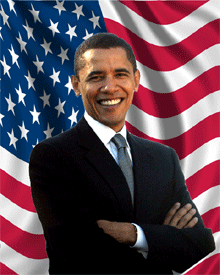

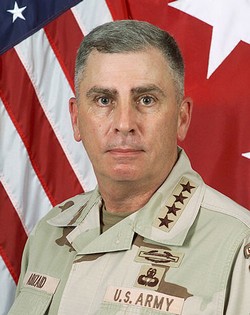
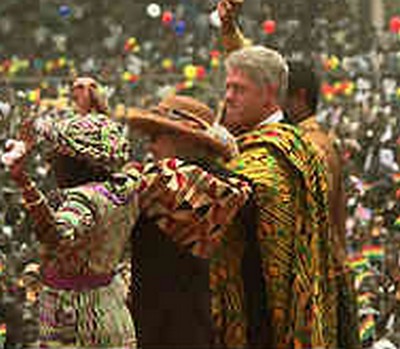
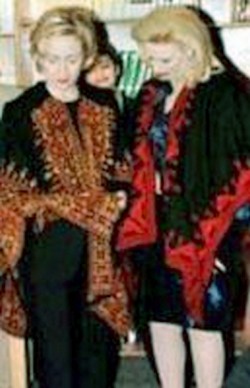
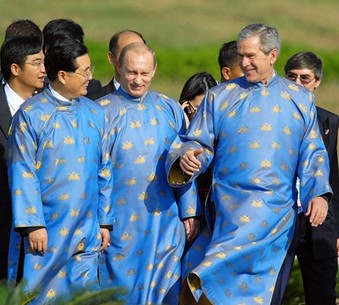
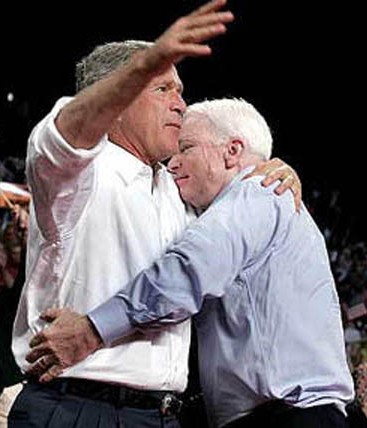
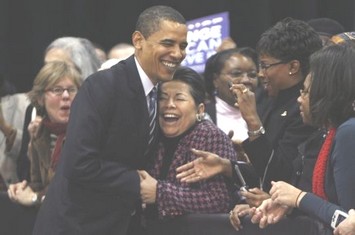
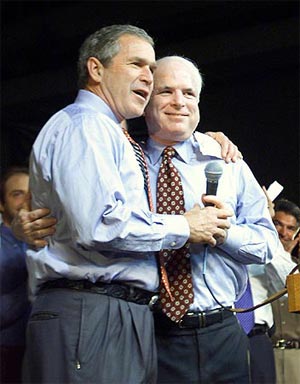
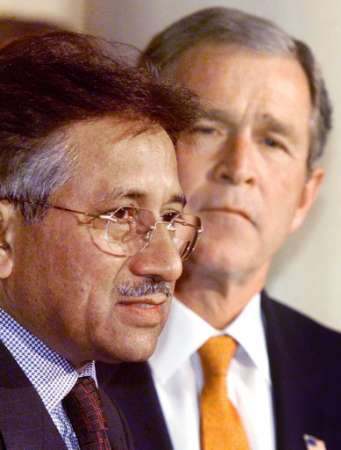
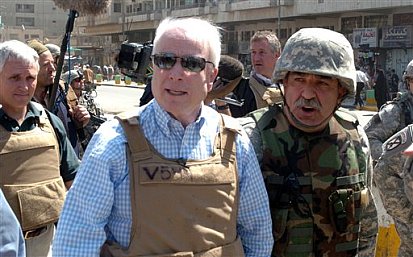
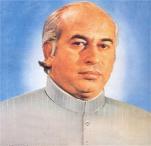
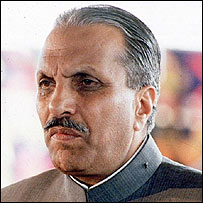
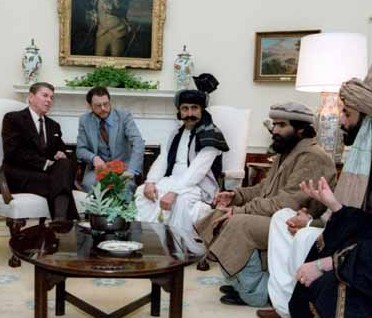
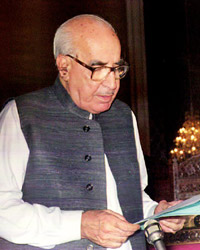
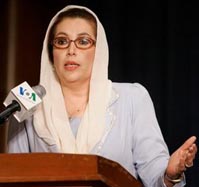

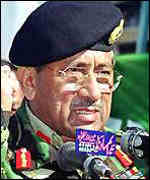
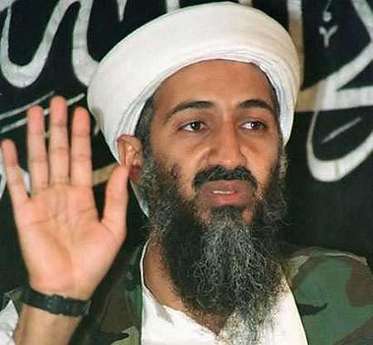

 |
|
 Facebook
Facebook




